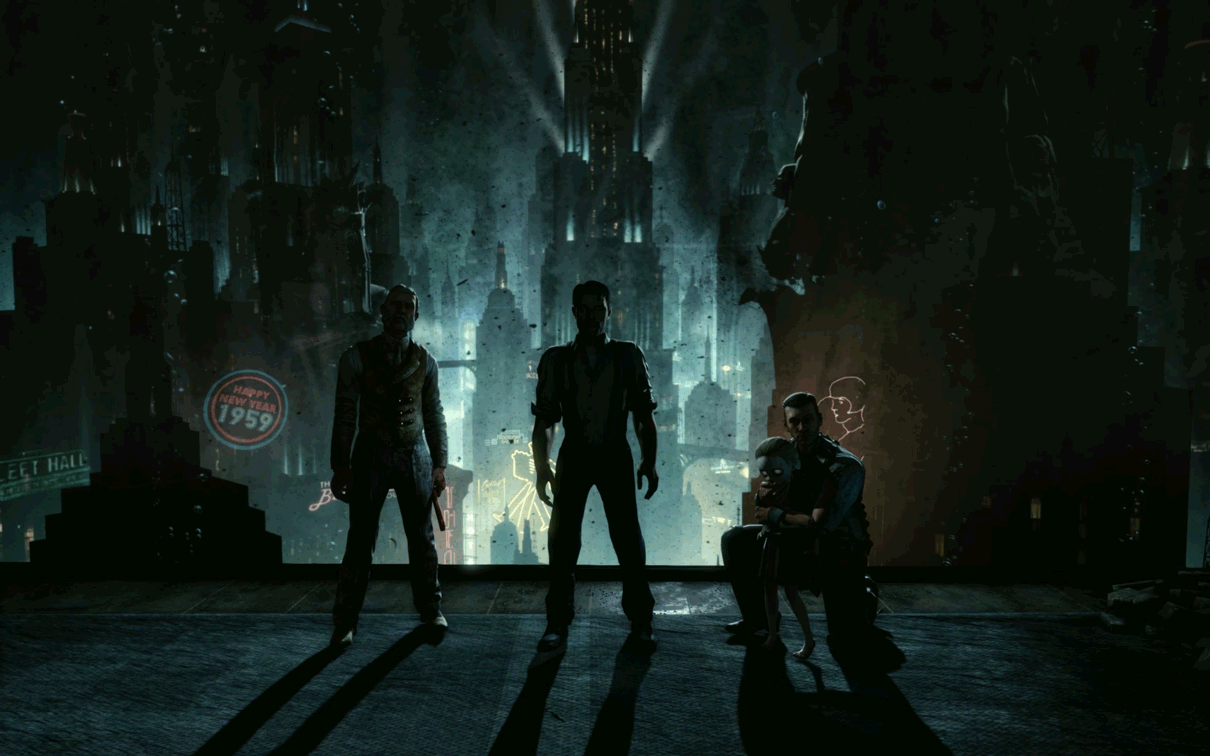BioShock: The Failed Experiment
How a video game explored the natural consequences of Objectivism

Objectivism is a political system that emphasizes unrestricted and unregulated capitalism as the main tenant. Author Ayn Rand developed the concepts of objectivism in her novels (The Fountainhead and Atlas Shrugged in particular). In the words of Gordon Gekko, “Greed, for lack of a better word, is good.” The idea of a complete objectivist utopia is the basis for the game BioShock, a first-person shooter from Ken Levine.
Originally conceived as a spiritual successor to the cult classic System Shock 2, BioShock utilizes many of the same gameplay mechanics as SS2. Ken Levine then took the skeleton of gameplay to design a game that utilizes his literary background to explore the themes of a system of government that remains popular decades after Ayn Rand’s death.


Story: Enraptured by Rapture
The story of BioShock begins after a plane crash in the middle of an ocean. Jack, the main character, swims toward a distant lighthouse which turns out to be the entrance to the underwater city of Rapture. Rapture is an Art Deco nightmare of epic proportions, filled with all manor of deformed people, monstrous machines, and the terrifying tandem of Big Daddies and Little Sisters harvesting “ADAM” from dead bodies. Under all the grime, blood, and flooded corridors, the world of Rapture was once a beautiful underwater city, but some undefined, catastrophic breakdown has occurred.
The first man you hear on the radio walks you through the history of the city and gives you one name as the cause of the destruction: Andrew Ryan. What follows is the journey of Jack to find Andrew Ryan. When they finally come face-to-face, Jack is told his true purpose and a twist comes into play that recontextualizes the gameplay significantly. After killing Ryan, Jack has to find Frank Fontaine, the voice that first directed Jack to Ryan. They finally have their last confrontation in which Jack emerges victorious and escapes in one of three different endings depending on the player’s actions with the Little Sisters during the game.
From a story standpoint, BioShock should have ended after Ryan’s death. The last quarter of the game has no stakes, the themes of the game have run their course and so this section is a bore. The last battle with Fontaine as a giant Atlas statue for some reason is laughably bad and the player’s reward is a quick 30 second cutscene that feels racked on to have “multiple endings.” What would have been a tight 6–8 hour game became a slog when another 2–3 hours are hoisted on the player.
Setting: 20,000 leagues under the sea
Rapture is a city under the sea; it is a way for its denizens to separate themselves from the outside world, reminiscent of Galt’s Gulch, the city where the industrialists on strike live in Atlas Shrugged. Rapture also invokes the legend of Atlantis, the mythical Greek city that was said to be under the sea. Everywhere in the city are large windows, showing the watery world outside as a blatant showing of humanity’s “dominance” of the natural world. The non-windowed walls invoke the feeling of 1950s wealth.
Every inch of Rapture exudes opulence and speaks to the ego of its residents. The entire city exists as a literal temple to the hubris of mankind. This is a city that shouldn’t exist, but thanks to the ingenuity of men and women, it not only exists but is also inhabitable. Or at least used to be.
It’s said that what goes up must come back down, and in Rapture this is played out literally. The fall of Rapture is a literal representation of the cutthroat world of business especially with no oversight. “ADAM” is a finite resource, and people literally murder each other to collect a little more. In reality, the markets are a finite resource where businesses slash and attack each other for greater “market share.”

Gameplay: Big Daddies and Plasmids
BioShock is a slow-paced first-person shooter with special player upgrades called Plasmids. For a player who enjoys more fast-paced shoot ’em ups, this slow pace might be a deal breaker for them. Jack moves slowly and fires slowly, but this lack of speed is offset by each bullet or melee swing being very impactful. The standard enemies (called Splicers) often going down with a couple shots from the pistol.
Plasmids add to the standard combat, and they allow the player access to various elemental powers as normal as fire and more interesting like the ability to summon a swarm of bees against enemies. As the years have marched on, these powers become less and less special due to numerous games since having this feature, often in a deeper and more useful way.
At several points during BioShock, Jack is confronted with a giant diving suit and the little child that it is protecting. If the player can overcome the “Big Daddy,” the player is then granted a choice with the “Little Sister”: Jack is able to either harvest her to receive the highest amount of ADAM, or save her to receive less ADAM (but a better ending). ADAM is then used as the way to purchase further Plasmids. This is basically BioShock’s version of a progression system and moral choices.
Player: Would you kindly?
The phrase “Would you kindly?” is one of those old-timey sentences, a polite nicety like saying “please” or “could you.” In the south it’s considered a gentlemanly thing to say.
In BioShock, it seems like this is all it is, but the meaning goes deeper that that. When Jack meets Ryan it is revealed that he is Ryan’s son, trained from an early age to obey any instruction beginning with “would you kindly?” This not only changes the entire tone of the previous gameplay, but is a moment of clarity for the player where the puppet sees the strings. The game begins with the words, “Would you kindly pick up that wrench?” The player does it because it’s an objective, a check in the box needed to finish the game. The player can’t refuse in the same way Jack can’t refuse.
Games and players have an implicit agreement with each other. Gamers allow games to direct them in the name of entertainment, while games will in turn make the strings invisible and allow the player the illusion of freedom to figure out the game’s puzzles for themselves. Even open-word, “go anywhere” games exert a surprising amount of control over a player. BioShock makes this control explicit through the use of “Would you kindly?” The only way the player can refuse would be to stop playing, but that’s no fun.

Theme: Objectivism unleashed
Ayn Rand imagined a world where wealth would be collected by only the most driven people. No money could be taken through manipulation by the government or other looters (such as charity or religion) by force or manipulation. The less driven people would be forced out of business by “better” people. Basically, it’s pure capitalism without any government oversight.
Rapture is a world that Ayn Rand and her followers would call utopia. A city where wealth is only gained from the sweat of someone’s brow and their mental efforts. Unfortunately, with no regulation and oversight but what the market provides, unethical business practices are allowed to thrive. ADAM is found to give people powers, and despite the fact that it mutates and deforms the user, people buy it. The insanity fueled by desire for more Plasmids causes a breakdown in society until few inhabitants are left and the few that are have little resemblance to the humans they once were. This is the end result of completely unrestrained capitalism, where the owners have power over the rest, and the ends (money) justify the means (literally dangerous business practices).
This can be seen on a smaller scale in our own world. Corporations will push whatever legal boundaries necessary to maximize profits with little regard (or even outright hostility) to consumers. Any legal boundaries can often be circumvented by giving enough money to government officials (at least in many parts of the world). Again, the ends justify the means.
A major theme in Ayn Rand’s work is how the Capitalist’s only moral obligation is to make a profit — the more profit that the Capitalist makes, the more morally correct they are. Atlas Shrugged deals with what would happen if these men just up and went on strike after listening to “Smartest, Sexiest Man in the World (tm)” John Galt. Rapture is an almost identical parallel to this “capitalist utopia.”
Is a man not entitled to the sweat of his brow?
‘No!’ says the man in Washington, ‘It belongs to the poor.’
‘No!’ says the man in the Vatican, ‘It belongs to God.’
‘No!’ says the man in Moscow, ‘It belongs to everyone.’
I rejected those answers; instead, I chose something different.
I chose the impossible. I chose…Rapture.
A city where the artist would not fear the censor.
Where the scientist would not be bound by petty morality.
Where the great would not be constrained by the small!
Andrew Ryan
In practice, this lack of regulation leads to Rapture becoming a literal war zone where the inhabitants fighting for the most precious resources — Adam and Plasmids — not worried about the pain and violence they bring to other inhabitants.
The ADAM flows like a river
BioShock has, in recent years, taken its place as a modern classic. Its exploration of unfettered objectivism is used to great effect to build a world that is both foreign and yet easily recognizable. The story has a meta plot about how players interact with a game and make the relationship between puppet player and puppeteer developer explicit. If it wasn’t dragged down by a lackluster last few hours, it may sit in my top ten games of all time.
